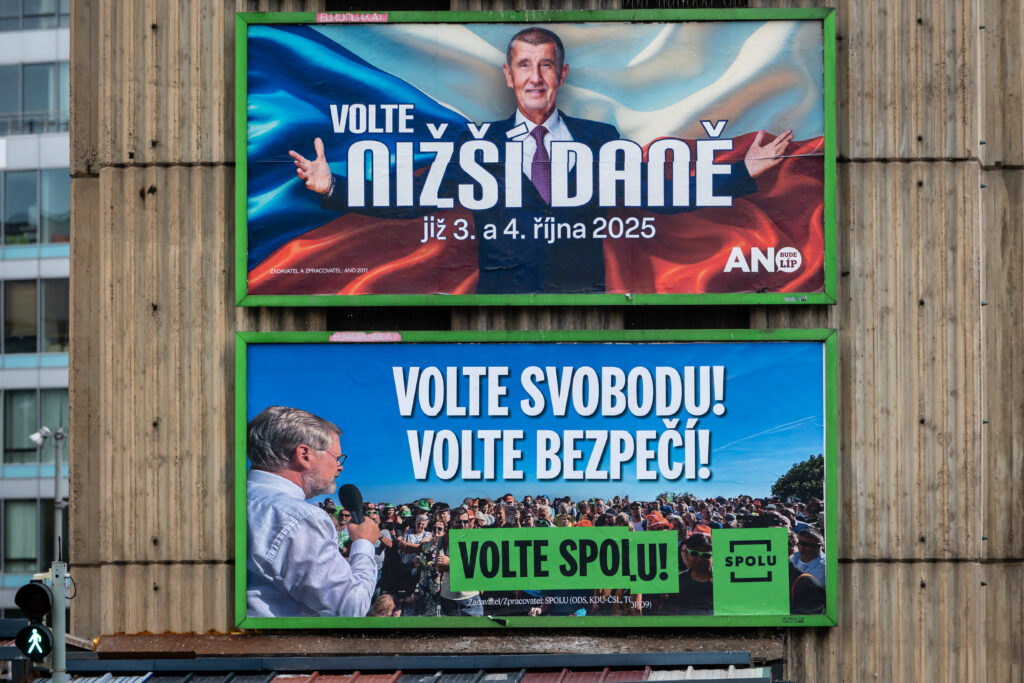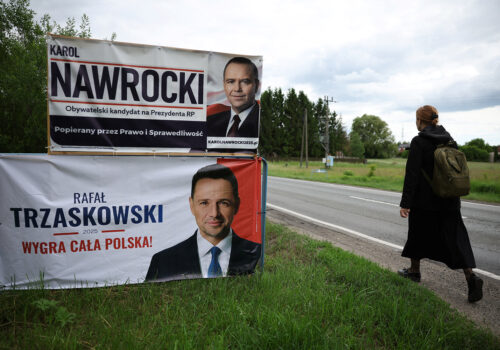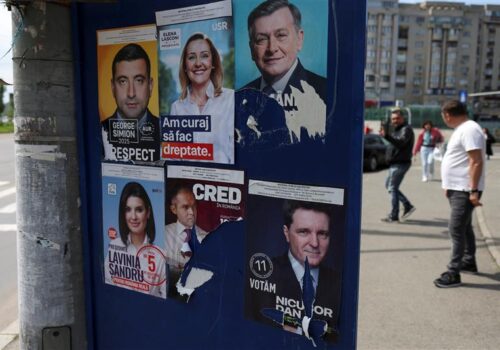The Czech Republic will head to the polls on October 3 and 4 to elect its next Chamber of Deputies, the lower chamber of the Czech parliament. This election has the potential to return populist candidate Andrej Babiš’s Action of Dissatisfied Citizens (ANO) party to power, raising questions about the Czech Republic’s Euro-Atlantic posture and support for Ukraine.
Ahead of the elections, experts from the Atlantic Council’s Europe Center answer the most pressing questions about the leading parties, the most prominent campaign issues, and what the results could mean for the country’s approach to the European Union (EU), NATO, and Ukraine.
What is the electoral process?
Elections for the Czech Republic’s Chamber of Deputies are held every four years. The Czech Republic employs a proportional representation system in which all two hundred deputies are elected on open lists in the country’s fourteen electoral regions. To be eligible for seats, a single party must earn 5 percent of the national vote, coalitions of two parties must earn 8 percent, and coalitions of three or more parties must earn 11 percent of the vote. Voting will take place over the course of two days: the mornings of Friday, October 3, and Saturday, October 4.
—Eva Mulholland is a young global professional with the Atlantic Council’s Europe Center
Who is Andrej Babiš?
Babiš leads the populist party ANO. ANO has undergone ideological shifts over time, making it difficult to pinpoint the party as right-wing or left-wing. But it is currently aligned with the far-right, Euroskeptic, and nationalist Patriots for Europe group in the European Parliament. It is best characterized as antiestablishment, and the party’s platform often combines policies from both ends of the political spectrum. Babiš is a wealthy businessman turned politician who has been called “the Czech Donald Trump.” He has led ANO since 2011 and was first elected to Parliament in 2013, serving as first deputy prime minister and minister of finance. He then became prime minister after ANO decisively won the 2017 parliamentary elections with 30 percent of the vote on an anti-immigrant, anti-corruption, antiestablishment platform. Babiš has been implicated in numerous corruption scandals, including for the alleged misuse of EU subsidies related to his farm known as “Stork’s Nest,” and allegedly purchasing a French Riviera estate using offshore companies. Despite these scandals, Babiš remains popular and has led in the polls since the beginning of the campaign cycle.
—Eva Mulholland
How do Czechs view the incumbent government?
Polls suggest that the outgoing Czech prime minister, Petr Fiala, is one of Europe’s least popular leaders, failing to win the trust of a staggering 77 percent of Czechs. He has adopted some unpopular measures, such as hiking taxes and pursuing efforts at fiscal consolidation. His pro-Ukraine stance has also been weaponized against him by his political opponents at home. His low approval rating has been interpreted as more the result of failed political communication than the government’s actual performance. Fiala’s government has pursued policies of restraint at a time when many of his Central European counterparts have opted for expediency and bombast.
Abroad, Prague was among the most stalwart defenders of a pro-Western orientation in Central Europe and a dependable partner in NATO and the EU. At home, the administration aggressively pursued fiscal health and delivered on its promise of energy autonomy from Russia by ending its pipeline gas dependence on Moscow in January. Fiala’s administration also managed energy prices by providing targeted assistance to industry. This stands in contrast to the populist policies, such as household energy support, rolled out by the leaders of Slovakia and Hungary, which put the health of their economies on the line to win votes.
But this approach of prudent governance has failed to register with ordinary citizens, empowering ANO and fringe parties, including ones advocating for the Czech Republic to leave the EU, such as the Freedom and Direct Democracy (SPD) party. Centrist leaders who deliver responsible policies often find themselves undone by their inability—or unwillingness—to seize the narrative, ceding ground to the emotional immediacy of populists and fringe parties to the detriment of hard-won democratic and economic advances.
—Sona Muzikarova is a nonresident senior fellow with the Atlantic Council’s Europe Center.
How did we get here?
What does this election mean for the Czech Republic’s Euro-Atlantic future?
The parliamentary elections pit the incumbent liberals/centrists against populist, inward-looking, and nationalist political parties. The populist and nationalist parties hold an edge, reflecting dissatisfaction with economic conditions and other domestic issues.
An ANO victory would mark another success by illiberal political forces in Europe. This does not mean that the Czech Republic would join Hungary as a supporter of Russia. For one thing, Petr Pavel, the Czech Republic’s pro-Ukraine, pro-Western president, has some agency over who gets a mandate to form the next government. Babiš has a reputation as sufficiently pragmatic (or cynical) to downplay his Ukraine-skeptic and NATO-skeptic views in the interest of taking power again. Moreover, knowledgeable Czech friends tell me that a grand coalition between ANO and Spolu, the centrist ruling coalition, is possible depending on the final results. Still, if an ANO-led government were to take power, the Czech Republic might no longer play an active role in supporting Ukraine, as it has until now.
Thirty-five years after overthrowing communism, politics in the Czech Republic has become like that in other European countries: restive, with room for parties on the far right and far left to grow. Their ability to do so, in the Czech Republic and elsewhere, reflects popular dissatisfaction with economic prospects and other domestic issues, despite astonishing economic growth in the country since 1989.
—Daniel Fried is the Atlantic Council’s Weiser Family Distinguished Fellow and a former US ambassador to Poland.
What are the parties to watch?
ANO
Leader: Andrej Babiš
European Parliament group: Patriots for Europe (co-founded by Babiš)
What is ANO? ANO represents a populist, Euroskeptic, and national conservative choice for Czech voters. Babiš has been critical of the current government on many fronts, particularly on its support for Ukraine and on immigration policies.
Campaign promises:
– Lower energy costs and nationalize ČEZ, the Czech Republic’s largest corporate supplier of energy
– Raise pensions, lower the retirement age, raise salaries, and cut corporate taxes
– Reevaluate the EU’s influence on Czech domestic and foreign policy
– Preserve Czech sovereignty and the Czech currency, the Koruna
Campaign platform:
– Participation in the EU and NATO, but with a focus on Czech national interests
– Defense of national sovereignty within the EU
Spolu Coalition (Civic Democrats, TOP 09, Christian Democrats)
Leader: Petr Fiala
European Parliament group: European People’s Party / European Conservatives and Reformists
What is Spolu? Spolu is the current ruling coalition, comprised of the Civic Democratic Party (ODS), TOP 09, and KDU-ČSL. Fiala is one of the EU’s most unpopular leaders, with an approval rating of less than 30 percent.
Campaign promises:
– Raise Czech defense spending toward NATO’s new 5 percent target and continue support for Ukraine
– Reduce the national debt
– Reduce regulatory barriers for companies and provide support for entrepreneurs
Campaign platform:
– Ensuring a democratic future for the Czech Republic
– Maintaining Czech participation within the EU and NATO
– Resistance against populism and extremism within the Czech Republic and EU
Motorists for Themselves (Motoristé sobě)
Leader: Petr Macinka
European Parliament Group: Patriots for Europe
What is Motoristé sobě? Motoristé sobě adopts a right-wing populist, Euroskeptic platform. The party focuses on issues related to motorists, opposes green policies, and advocates national sovereignty.
Campaign promises:
– Opposition to a ban on combustion engines and the introduction of emissions restrictions
Campaign platform:
– Opposition to green policies and emissions permits
– Preservation of Czech sovereignty
– Skepticism of the EU
Czech Pirate Party
Leader: Zdeněk Hřib
European Parliament Group: Greens/European Free Alliance
What is the Czech Pirate Party? The Czech Pirate Party is a progressive, pro-European party. The party had formerly been the fifth member of the ruling coalition but left in 2024 after Fiala proposed the dismissal of Czech Pirate Party member and Regional Development and Digitization Minister Ivan Bartoš.
Campaign promises:
– Provision of affordable housing with a plan to construct 200,000 new homes
– Provide support for families through tax cuts and implementing higher parental allowances
– Ensure security through the EU and NATO
– Provide support for entrepreneurs and enact flexible employment rules
Campaign platform:
– Ensuring economic equality through tax reform
– Fighting corruption and extremism while integrating advanced technologies into public services
– Ensuring equitable healthcare access to people of all identities and socioeconomic statuses
Freedom and Direct Democracy (SPD)
Leader: Tomio Okamura
European Parliament Group: European Sovereign Nations
What is Freedom and Direct Democracy? SPD is a far-right alliance between the Trikolóra, Svobodní, and PRO parties, centered around anti-immigration and Euroskeptic policies. Party leader Tomio Okamura is currently facing up to three years in prison on charges of incitement of hatred, after launching a controversial anti-immigration poster and billboard campaign in the run-up to regional elections.
Campaign promises:
– Prevent illegal immigration and oppose the EU Migration Pact
– Propose a referendum on leaving the EU and NATO
– Institute direct democracy, including by passing a law on referenda and recall elections
Campaign platform:
– Criticism of the current government, the Green Deal, financial aid to Ukraine, and the EU Migration Pact
– Opposition to Western institutions and policies
Stačilo!
Leader: Kateřina Konečná
European Parliament Group: Non-attached
What is Stačilo!? Stačilo! is a left-wing populist alliance between the Communist Party, ČSNS, SD-SN, Social Democrats, and others. The alliance has communist roots and adopts nationalist, Euroskeptic policies. Its platform opposes both the center-right government and ANO, promoting national sovereignty and social justice.
Campaign promises:
– Provision of healthcare for all, with a focus on support for the traditional family
-End economic dependence on the EU through the nationalization of strategic infrastructure, protecting the Czech currency, and creating a state-guaranteed pension system
– Leave NATO and the EU
– Cancel the purchase of F-35 fighter jets
Campaign platform:
– Opposition to Czech membership in NATO
– Rejection of reliance on the EU
Mayors and Independents (STAN)
Leader: Vít Rakušan
European Parliament Group: European People’s Party
What is Mayors and Independents? STAN is a centrist, pro-European party that has cooperated with the Spolu coalition to lead the Czech government. The party’s priorities include instituting greater local governance and increasing decentralization.
Campaign promises:
– Support entrepreneurship and innovation to strengthen the job market
– Ensure efficient public administration to provide affordable housing, improved public transportation, rural development, and an effective education system
– Ensure public safety through the protection of the environment, accessible healthcare, and security through Western institutions
Campaign platform:
– Ensure good quality of life for all Czechs, from big cities to the rural countryside
– Continue to collaborate with the West in the EU and NATO
What are the top issues for voters?
Immigration
Immigration policies are a major concern for Czech voters. A poll released in August found that about 50 percent of Czechs view the arrival of foreign nationals as a problem for the country, with nearly half of the respondents believing that migrants pose health risks and contribute to higher crime rates. Ukrainian refugees are a particularly divisive issue. The Czech Republic hosts the highest number of Ukrainian refugees per capita in the EU and the third-highest overall. While 52 percent of Czechs support granting asylum to Ukrainians, 58 percent believe the country has already accepted too many. Additionally, 40 percent of respondents said they tolerate Ukrainians but are weary of their presence, and 60 percent incorrectly believe that Ukrainians take more money from the state than they contribute.
The economy
After several difficult years, the Czech economy returned to growth in 2024, with real gross domestic product rising by 1.1 percent. Continued growth is expected at a rate of 1.9 percent in 2025. While domestic demand has been the main driver, the external environment remains uncertain, and net exports are projected to weigh negatively on growth. Headline inflation is forecast at 2.2 percent in 2025, down slightly from 2.4 percent in 2024.
Despite this relatively favorable outlook, in a poll released last November, only 20 percent of Czechs viewed the country’s economic prospects positively, while 45 percent described the situation as poor. According to the Spring 2025 Eurobarometer, rising prices, inflation, and the cost of living were the top concerns, cited by 34 percent of respondents as the most pressing issues. The overall economic situation (21 percent) and government debt (19 percent) followed as the next most important challenges.
Ukraine
While support for Ukraine remains relatively strong in the Czech Republic, continued support for Kyiv has been a major issue during this election cycle. In a poll released in February, 44 percent of respondents reported support for Ukraine. However, 67 percent were concerned that the conflict will continue for multiple years, and 55 percent were concerned that the conflict will expand into a war between Russia and NATO. Czechs are also subject to misinformation about Ukrainian refugees and the war effort. In a study conducted by the Central European Digital Media Observatory, 53 percent of respondents found it credible that Ukrainians had brought whooping cough into the Czech Republic and 39 percent found it credible that the commander-in-chief of Ukraine’s armed forces had called for an uprising against the Ukrainian government.
Jack Muldoon, a young global professional with the Atlantic Council’s Europe Center, contributed to the graphics and background research for this article.

The Europe Center promotes leadership, strategies, and analysis to ensure a strong, ambitious, and forward-looking transatlantic relationship.
Further reading
Thu, May 29, 2025
Your primer on the Polish presidential election
Eye on Europe's elections By Aaron Korewa
Poland will vote for its next president on June 1. This election could kick off a period of political stability—or further cement a gridlock that could lead to the government collapsing.
Wed, May 7, 2025
Your primer on Albania’s parliamentary election
Eye on Europe's elections By
In the lead-up to Albania's parliamentary election on May 11, experts from the Europe Center unpack the key players, issues, and dynamics shaping this weekend’s election.
Wed, May 7, 2025
Your primer on the Romanian presidential election
Eye on Europe's elections By
Ahead of the second round on May 18, our experts are breaking down the race and its potential impacts on Romania’s foreign policy.
Image: An election billboard for Czech billionaire and former prime minister Andrej Babis from ANO party (top) and election billboard for Czech prime minister Petr Fiala from coalition SPOLU (bottom) seen on the street of Prague on September 18, 2025. Tomas Tkacik / SOPA Images via Reuters Connect.



